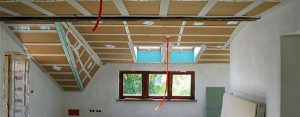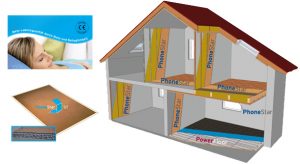Efficient sound insulation – A MUST HAVE in your home
Sound insulation is one of the most important components of the building process, as it directly determines the well-being of the occupants of a building, whether it is a residential building, an office building or a public space (hotel, hospital, clinic or other public building).
Sound insulation for a dwelling
is especially important because home is where you come back to after the day’s events and noises to relax and enjoy some quiet time. What is scan insulationFind out where it is used, where sound leaks usually occur and how to install effective sound insulation below!

What is sound and noise insulation?
Sound – the movement of mechanical energy in an elastic substance in the form of oscillations. Sound is described by a number of physical quantities, such as frequency, wavelength, amplitude, period, speed of sound, etc.
Insulation – isolation, enclosure, also a material that conducts (and therefore absorbs) vibrations poorly. So, sound insulation is the containment of energy fluctuations. Sounds too complicated in physics parlance, doesn’t it? Simply put, soundproofing ensures that you don’t hear the noises of your neighbours and the street, and that you yourself don’t disturb your neighbours with the noises of your home. It is part of the construction process, which is subdivided into:
- sound insulation for ceilings;
- sound insulation for the floor;
- sound insulation for walls;
- Sound insulation between floors;
- sound insulation of partition walls.
The lowest permissible sound transmission coefficients for buildings are determined by Latvian Building Code 016-15 Building Acoustics.
What types of sounds are distinguished in construction?
There are two types of sound in building acoustics – airborne and impact noise. Airborne sounds – these are sounds made in the air: conversations, TV, air ventilation, flapping, etc. Impact noise is caused by impacts on a surface that result in vibrations that produce sound, e.g. footsteps, washing machine operation, falls, pushing furniture, etc.

When to do some insulation?
Sound insulation for floors is important if you drop things a lot, have a tendency to move around loudly, have children or tend to have parties with lots of people and lots of different activities and dancing. Ceiling sound insulation You won’t be protected from neighbour noise, but you can protect your neighbours from it if your home is often full of airborne sounds – you talk loudly, argue, watch TV, sing, party, listen to loud music, etc. Interstage sound insulation during the construction or renovation of a building, for example when, Knauf sound insulation to increase the sound efficiency of the ceiling. Wall scan insulation is divided into three parts: external wall insulation, load-bearing wall insulation and insulation of the partition walls in the apartment. External wall insulation protects you from “outside” noises – cars, crowds of pedestrians, shop noises, public transport noises, airplanes, etc. Insulation in load-bearing walls will absorb sounds from neighbouring apartments and, in combination with external wall insulation, silence impact noise. The purpose of partition wall insulation is to protect you in one room from the noises that come from your apartment in the other room. If you crave
sound insulation for walls, price
for soundproofing your entire walls can be quite impressive, but it’s definitely worth it for the pleasant silence that will reign in your home.
Efficient sound insulation = quality materials + quality work
To get the best possible soundproofing result, you need to know what soundproofing solution and materials would be most effective and best for you, but that’s not enough – you also need skilled craftsmen to create the soundproofing without distortion, in the right thicknesses and with the right use of materials. If you’ve never done it yourself, or if you’re not 100% confident in your abilities, leave it to the professionals! You won’t be disappointed.

